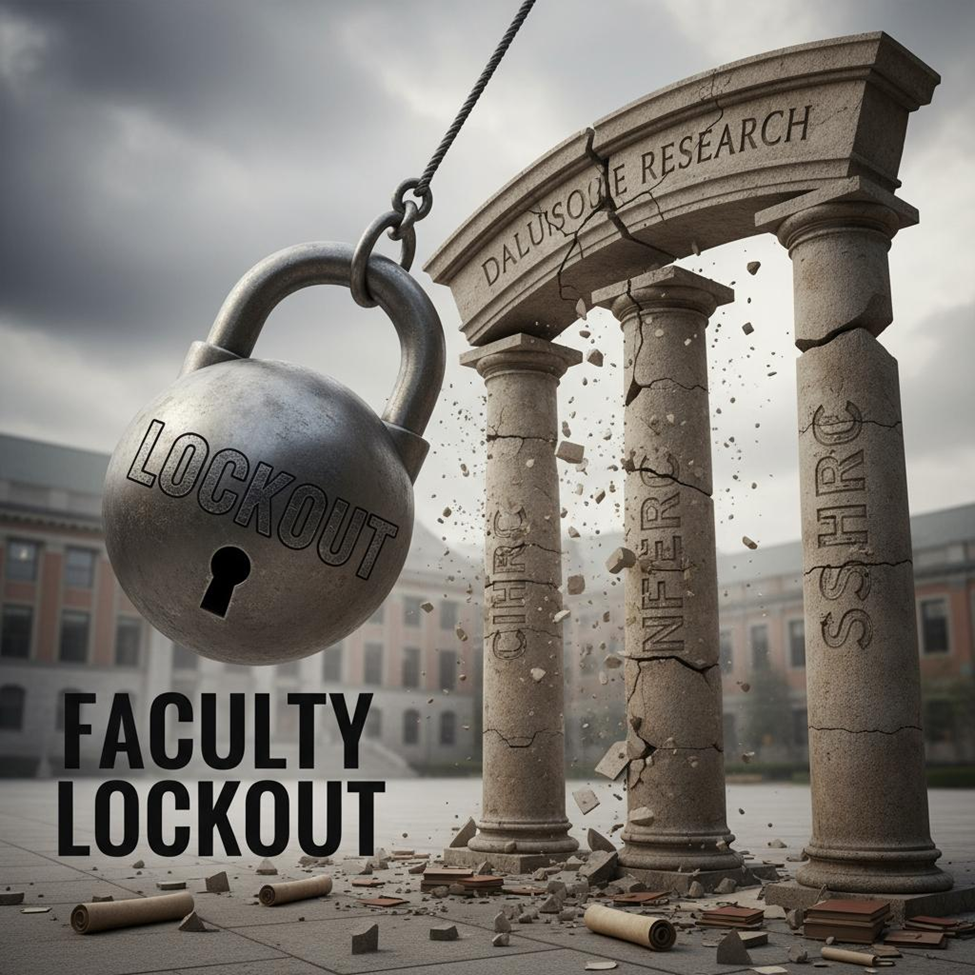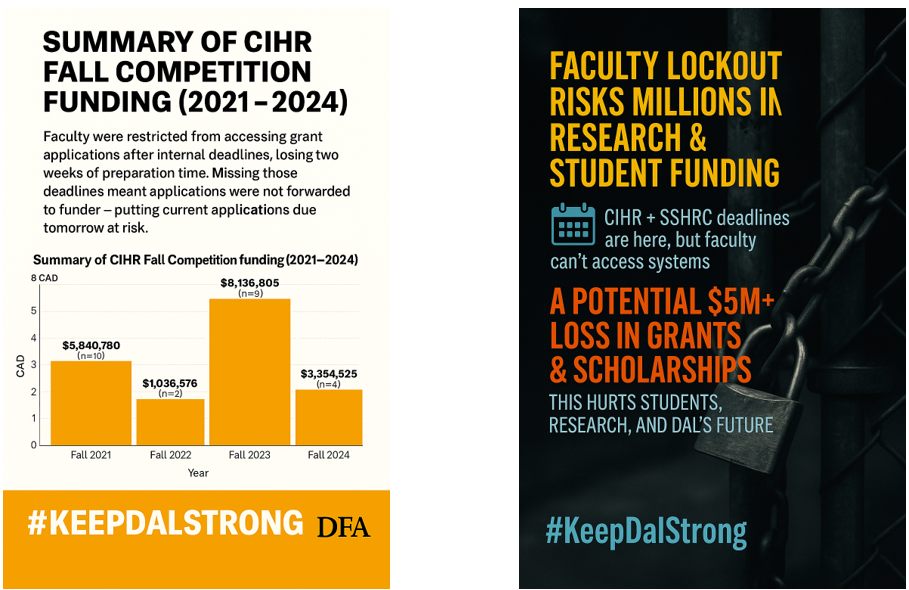Locked Out of Opportunity: How Dalhousie’s Faculty Lockout Threatens Research Funding and Student Futures

As the faculty lockout at Dalhousie University continues, its consequences are beginning to crystallize in ways that go far beyond the picket lines. With major federal grant deadlines looming, the university’s unwillingness to support its researchers and students and its persistence in keeping faculty locked out is putting millions of dollars in funding at serious risk. This funding, along with training students and new researchers, is essential to maintaining the future of Dalhousie’s research ecosystem.
This week should have been a final push for researchers to submit applications for the Canadian Institutes of Health Research (CIHR) and the Social Sciences and Humanities Research Council (SSHRC) Insight Grants, two of the most significant funding opportunities in the Canadian academic calendar. But due to the lockout, faculty members were denied access to their applications effectively cutting two weeks from their preparation time. Worse still, they were told that if they missed the internal deadline, their applications would not be forwarded to the funder at all.
This lockout-caused bottleneck has real financial consequences. In the CIHR Fall 2024 competition alone, Dalhousie researchers secured $3.35 million in funding across four projects. In previous years, the numbers were even higher: $8.1 million in 2023 and $5.8 million in 2021. If this year’s applications are weakened or blocked entirely due to the lockout, Dalhousie could lose millions in research funding. These funds support postdocs, students, research staff, lab personnel, and many research overhead costs.
The situation is equally dire for SSHRC Insight Grants. According to internal estimates, the lockout could result in a loss of $1.23 million in SSHRC funding based on the five-year median grant capture. These grants are not just financial lifelines for faculty research, they also provide up to six years of support for research and publication, and they contribute directly to Dalhousie’s reputation as a U15, research-intensive university.
Doctoral students are also caught in the crossfire. The internal deadline for SSHRC’s new CGRS-D doctoral fellowship competition is October 6, and each award is worth $120,000 over three years. Based on past success rates, Dalhousie could expect around 13 students to win these fellowships, totaling $1.56 million in student funding. But with faculty locked out and unable to help students prepare applications or submit reference letters, those chances are rapidly diminishing.
The long-term impact? Top students may choose to pursue their doctorates elsewhere, taking their talent, and funding, with them.

The lockout is also affecting SSHRC Partnership Grants, which rely on collaboration between institutions. Reports suggest that Dalhousie partners are being removed from applications because they cannot access the university’s Office of Research Services (ORS) system. This not only undermines current proposals but could damage Dalhousie’s reputation as a reliable research partner in future collaborations.
The numbers speak volumes. CIHR projects currently funded at Dalhousie include cutting-edge research in neuroscience, cancer therapy, Indigenous health, and AI-based mental health monitoring. These projects range from $141,000 to over $1.1 million each, and many involve multi-year, multi-investigator teams. Losing even a fraction of this funding would be a blow to Dalhousie’s research capacity and its ability to attract and retain top scholars.
Student scholarships are also at risk. In 2025, CIHR doctoral scholarships awarded to Dalhousie students totaled $389,997 across three recipients. These awards are critical for supporting graduate education and ensuring that students can focus on their research without financial hardship.
What’s most troubling is that these losses are not hypothetical.
They are happening.
The deadlines are this week. The lockout has already disrupted workflows, blocked access to systems, and created uncertainty that undermines the confidence of researchers and students alike.
Beyond the immediate financial impact, the lockout threatens Dalhousie’s long-term standing in the national research landscape. Funding success is cumulative: strong applications lead to strong projects, which lead to publications, partnerships, and future grants. Interrupting this cycle will have ripple effects that last for years and those ripples will be in the shape of Dalhousie administration.
Dalhousie has long prided itself on being a leader in research and innovation. But leadership requires infrastructure, support, and trust. Right now, those foundations are cracking. If the university cannot resolve the lockout and restore access for its faculty and students, it risks not only losing millions in funding but also damaging its reputation as a place where world-class research can thrive.
The stakes are high, and the clock is ticking.
Note: All numbers in this document are taken directly from Dalhousie research year-in-review documents and other published materials including public Tri-Agency funding documents.